Creation
 for some intense thematic material.
for some intense thematic material.
Reviewed by: Scott Brennan
CONTRIBUTOR
| Moral Rating: | Average |
| Moviemaking Quality: |
|
| Primary Audience: | Teens Adults |
| Genre: | Biography Drama |
| Length: | 1 hr. 48 min. |
| Year of Release: | 2009 |
| USA Release: |
UK: September 25, 2009 USA: January 22, 2010 (very limited) DVD: June 29, 2010 |
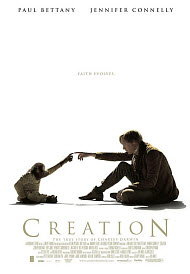

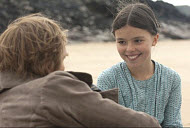
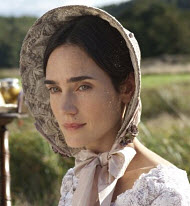
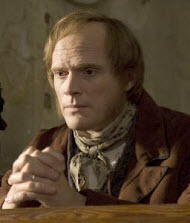
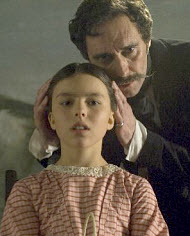
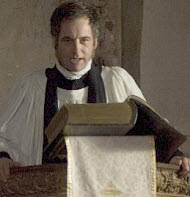

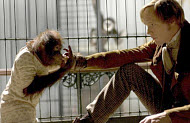
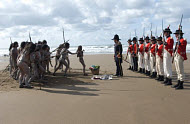
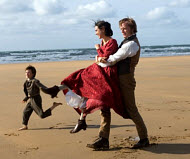
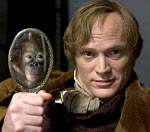
CHARLES DARWIN—Was he a Christian? Did he believe in God? Did he recant evolutionism when he died? Answer
DEATH and SUFFERING—What about the issue of suffering? Doesn’t this prove that there is no God and that we are on our own? Answer
What kind of world would you create? Answer
How did bad things come about? Answer
Why does God allow innocent people to suffer? Answer
Does God feel our pain? Answer
How do we know the Bible is true? Answer
When we say that the Bible is the Word of God, does that imply that it is completely accurate, or does it contain insignificant inaccuracies in details of history and science? Answer
How can the Bible be infallible if it is written by fallible humans? Answer
Answers to supposed Bible “contradictions” and puzzles
Is the Bible truth or tabloid? Answer
INTERNAL HARMONY—Answers to a skeptic’s questions about whether the Bible’s internal harmony is truly evidence of its divine inspiration—Read
How can we know there’s a God? Answer
What if the cosmos is all that there is? Answer
If God made everything, who made God? Answer
Is Jesus Christ God? Answer
Death in the Bible
What is the eternal destiny of an infant or young child who dies? Answer
Which universities, colleges, and seminaries teach a literal Genesis, including six-day, young-Earth Creation? Answer
| Featuring |
|---|
| Jennifer Connelly (Emma Darwin), Paul Bettany (Charles Darwin), Jeremy Northam (Reverend Innes), Toby Jones (Thomas Huxley), Benedict Cumberbatch (Joseph Hooker), See all » |
| Director |
|
Jon Amiel “The Singing Detective,” “Entrapment” |
| Producer |
| Recorded Picture Company (RPC), Ocean Pictures, BBC Films, See all » |
| Distributor |
| Newmarket Films |
“Mr. Darwin, Sir, either you are being disingenuous, or you do not fully understand your own theory. Evidently what is true of the barnacle is true of all creatures, even humans. Clearly, the Almighty can no longer claim to have authored every species in under a week. You have killed God, Sir.”
These are the words of Thomas Huxley in the film, one of his peers in the scientific community, who was desperately urging Darwin to move forward with the publication of his book On the Origin of Species. Huxley argued it was time for Darwin to break loose from the bonds that kept him subject to society’s mores and urged him to move quickly toward rescuing science from the bondage of the church and her archbishops.
This idea, that Darwin, with his Galapagos Island finch reports, somehow killed God is the basic historical knowledge that lies at the forefront of the common man. But few, if any, really know much about Darwin’s personal life beyond that. It may have been the intent of the creators of “Creation” to humanize Darwin, and remove the God-killer reputation from the Darwin family name and bring to life instead, some relatively unknown facts about him through the eyes of both his wife and children—a compelling story in its own right.
The film does not deal with the questions about the validity of evolutionary theory as presented by Darwin. [To date, there are an increasing number of scientists who have long since departed from that scientific philosophy—and are seeking another more adequate explanation for the lack of transitional life forms in the fossil record or the increasing irreducible complexity of living things at the cellular level which appear to be by design rather than random modification. ] (For more on the “Theory of Evolution in Crisis,” see Darwin’s beliefs on this very Web site.) Instead, this film takes a look at the human side of Charles Darwin, and how he may have been, in fact, conflicted in his willingness to publish what he thought were observable facts, due in part, out of respect for his Christian colleagues, his wife, and for society at large. Nevertheless, he did publish, however, and what may have led up to that remarkable event, is the subject matter of this provocative story based on the book Annie’s Box by Randall Keynes.
This moral dilemma, to publish or not to publish, was the backdrop of director Jon Amiel’s entire film, and the tight screenplay by co-writer John Collee, one that gave credence to the fact that Darwin did struggle with his discoveries, however slanted they may have been. The film portrays the Victorian era, with its adherence to Christian society and its subsequent move to civilize the world, near and far, with a missionary mind for the purposes of the gospel.
The dilemma is continued by focusing in on a more intimate portrait of Charles Darwin’s middle years. It begins when he took his first cousin Emma to be his wife and follows with the subsequent raising of their 10 children at Down House at Kent, in the English countryside where Darwin did much of his research on barnacles and pigeons.
Darwin was powerfully brought to life by actor Paul Bettany. Paul’s real-life wife, Oscar-winning actress, Jennifer Connelly (“A Beautiful Mind”), convincingly portrays Darwin’s wife Emma and gives us the antagonist character of the “person of faith,” who expressed her doubts about Charles’ work from the onset. Although she was Unitarian in her beliefs, by her upbringing, she was deeply religious, and my research leads me to believe she became an evangelical Christian at some point in her adult life. That aside, the necessary conflict was set for the film, both on a personal level of love for one another as well as Darwin’s personal “war with God,” as Emma refers to it in the film.
Possible objectionable content
I believe there was only one use of the “d” word and the name of “Christ” was also used in vain—once—by a character from whom you would expect such words, “Darwin’s Bulldog” as he would come to be called, Thomas Huxley.
There was only a brief montage of Charles and Emma in bed as a married couple, and it was done tastefully and with reverence—showing only hugging and some kissing, sleeping and cuddling—all under the sheets, as it were, and important for the storyline at the segment where it was shown. Additionally, there were a few seconds in the beginning of the film where two small native children of Tierra del Fuego ran bare bottomed away from the camera toward their relatives, in a sequence that was reminiscent of a National Geographic piece, as Charles was recounting the story of some of his early adventures—to his eldest child Annie—in what was to be one of many charming storytelling scenes throughout the movie.
As to accuracy, the film avoids documenting completely, known facts, such as the theory of evolution being presented, not only by contemporaries of Darwin, like anthropologist Alfred Russel Wallace, whose 20 page abstract about evolutionary theory was simultaneously published with a portion of Darwin’s writing in 1858—more than a year prior to the publication of On Origin of the Species, and, also, about Darwin’s own father’s and grandfather’s ideas before him. Erasmus, Darwin’s grandfather, was a renowned proponent of evolution (then called transmutation theory) some sixty years before Darwin’s own theories were published. These facts alone, call in to question both the uniqueness of Darwin’s thought processes and the objectivity of his worldview, which had clearly been established—long before any of his scientific investigations had begun.
Further, there is difficulty in the poetic license granted by the viewer to the gifted writers Collee and Amiel, whereby they crafted a carefully woven story-line around three main events in Darwin’s life: 1) the problem of publication of the book by Darwin tied in with 2) his own struggle with his ailing health (possibly psychosomatic) as a result of the 3) subsequent trauma due to of the loss of his firstborn, Annie Darwin, for whom he had great affection. While there may be evidence that there are connections to these events in Darwin’s life, coupled with his possible hesitation to publicize his theory due to the profound implications it would have on Victorian society—it does not do so without some skepticism. There are multiple “missing links” in the complex development of all human lives and the reasons for our actions, including Darwin’s behavior as illustrated in this film. The apparent oversimplification of his behavior, namely to reduce his personal “mein kampf” to these three events—alone, and then present them as fact, is somewhat suspect.
Finally, the composition of such a script, where faith is pitted against science (and their have been many over the years), always seems to contain the same outcome, namely that “either-or” conversation, as I like to refer to it. Either science is correct and this “survival of the fittest” behavior is the explanation for what we call “evil,” or it is God’s fault, and He is directly responsible for all the mayhem and chaos in the world, as we know it. It’s either, or. No other explanation allowed. This shortcoming, is obvious to a prepared believer who truly understands the Torah. The state of the world was radically changed, and nothing “is” as it is supposed to be. (see Genesis) Characteristically, all arguments presented in the modern vernacular of film and literary works conveniently leave out that possibility, as if to say, what we can see, must in fact be the way it always has been. That negates a true understanding of the need for redemption and the meaning of the gospel, in its entirety.
Q&As
How did bad things come about? If the world before the Fall had no death or struggle, how can we explain the origin of animal and insect instincts designed to hurt and kill other living organisms? Answer
Why is the world the way it is? If God is all-knowing, all-powerful, and loving, would He really create a world like this? (filled with oppression, suffering, death and cruelty) Answer
That said, Amiel accomplished a great deal in an hour and 45 minutes, and much of what was portrayed had roots in primary source material, which punctuated an insightful dramatic rendition of a heretofore unknown personal life, that of Charles Darwin.
If the goal of the Darwin’s great-great-grandson, Randal Keynes, the author of Annie’s Box, along with the writers and director of “Creation” was to humanize Darwin and bury the iconic image of the stoic bearded man who walked with a cane and was slightly hunched over in his later years, then they brilliantly accomplished what they set out to do. Their personal motives for embarking on such a journey, like Darwin’s first voyage on the H.M.S. Beagle, remain known only to God. Keynes, as an heir to the Darwinian legacy, may have been attempting to redeem the character of his great-great grandfather in the writing of the book, in order clear up his grandfather’s lackluster image—one denounced particularly by those of faith over the century and a half since the publication of …Origin…. Equally, there are undoubtedly a myriad of reasons that the evolution of such a film as this may have occurred in the minds of all those involved in its creation, from the producer, Jeremy Thomas, to the actors themselves.
That being said, it is a film worth seeing, if only for the appreciation of art for art’s sake. The fantastic cinematography, the exquisite musical score, the superb lighting, the accurate costuming and detailed art direction, the brilliant performances by the entire cast, and the seamless flashbacks and flash-forwards by the director (my personal favorite), all make for a dramatic and enjoyable biopic, which, in my opinion, is difficult to do for this genre.
In addition, there was a strong portrayal of family, of self-less love, of praying together, and my personal favorite, the nightly reading of literature which included “The Pilgrim’s Progress,” which I believe is the second most published book other than the Bible.
Beyond that, I think the challenge of perceiving the life of someone who has had such a profound impact on the world, as we know it today, through a different set of lenses, regardless of the amount of literary license given to the writer and director, may do everyone a world of good. Even Darwin himself would agree to freedom of thought and expression, in this regard, as is evidenced by the following quote:
“I am a strong advocate for free thought on all subjects, yet it appears to me (whether rightly or wrongly) that direct arguments against Christianity and theism produce hardly any effect on the public; and freedom of thought is best promoted by the gradual illumination of men’s minds, which follows from the advance of science.”
This reviewer concurs and believes that the advance of science will continually prove the truth about God’s laws and his eternal word.
The evolution-creation debate has not ended, by any stretch of the imagination. The war between faith and knowledge, science and reason, love of family over love for profession—all themes in this dramatic film—are always worthy of exploration. For the mature Christian, there is nothing here to fear. In fact, the film presents, almost in remarkable equity, the possibility of having one’s personal faith strengthened, rather than challenged. As an avid film fan for many years, my reaction to any film—either positively or negatively—is always based upon my Christian worldview, one that I cannot be divorced from. What Darwin finds incredible in nature and attributes to evolutionary self-preservation, I grant to God’s ingenious imagination in his special creation. Therefore, the film “Creation” (which should have been called “Evolution,” given its proper nomenclature) only confirms what I already knew to be true: that in the end, everyone must make their own “leap of faith” toward some belief, be it based in science, religion, perceived facts, or the scriptures themselves.
How is it possible for reasonable, intelligent, well-educated people to hold such diametrically opposite views as Evolutionism and Creationism? Answer
Darwin himself said of evolution:
“The mystery of the beginning of all things is insoluble by us; and I for one must be content to remain an agnostic.”
The question remains for the viewer, what choice have you made already, or will you make in the future?
Violence: Minor / Profanity: Minor / Sex/Nudity: Minor
Review from ChristianAnswers Team Member, Answers In Genesis
by Mark Looy, CCO, Answers in Genesis
The tension between evolution and religion as it played out in the Darwin household is dramatized in this new film. With the provocative and arguably offensive title of “Creation” (originally called “Origin”), the movie not only presents how Darwin lost his remaining Christian beliefs, but also offers an account of his family life, particularly the death of his young daughter Annie. Her death was such a tragic event in Darwin’s life that he soon lost any vestige of his beliefs regarding Christianity. The tension of having a very religious wife (a Unitarian) only complicated matters, as Darwin wrestled over the question of why there is suffering and death in this world if there is a God. In fact, Annie’s death in 1851 became the bleak backdrop to the writing of his book On the Origin of the Species by Means of Natural Selection (1859), which the film recreates.
DEATH & SUFFERING—Doesn’t they prove that there is no God and that we are on our own? Answer
What kind of world would you create? Go
How did bad things come about? Answer
Why does God allow innocent people to suffer? Answer
In the Origin book, Darwin wove death into the fabric of his evolutionary story as a part of his proposed process for onward-and-upward evolution. He thus depicted death (ironically) as an integral part of life, which is in complete contradiction to the Bible’s teaching that death is an enemy and an invader into creation (as the result of Adam’s rebellion; 1 Corinthians 15:26; Genesis 3). As the film shows, the death of Annie destroyed Darwin’s remaining belief in the Christian faith. As two of his biographers have noted, the death of Annie “chimed the final death-knell for his Christianity. …Charles now took his stand as an unbeliever.” A. Desmond and J. Moore, Darwin: The Life of a Tormented Evolutionist (New York: W.W. Norton & Company, 1991), p. 387.
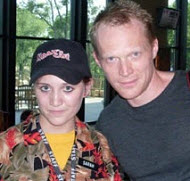
The film Creation, which some people take to refer to both the creation of the Origins book and the creation/evolution controversy, stars Paul Bettany, who is best known for his roles in popular movies such as “The Da Vinci Code,” “Master and Commander,” and “A Beautiful Mind” (in which he won the London Film Critics’ Award for Best British Actor). In “Creation,” he co-stars with his Oscar-winning wife Jennifer Connelly.
Bettany, by the way, visited our Creation Museum during June 2009. Bettany told the Daily Mail that the Creation Museum was “bananas. It was sort of funny initially, and then I found it sad. …I was so shocked.” Coming from a self-proclaimed atheist, such words are not surprising when a person is confronted with a totally different worldview.
“Creation,” based on the book written by Darwin’s great-great-grandson and entitled Annie’s Box, is a secular hagiography of Darwin, which is not surprising, given that modern films have a proclivity towards themes that fly in the face of biblical teachings. Bettany is an atheist himself and calls Darwin “a hero of mine, and I think in the absence of Jesus, he’s a really useful hero to have.” “Guardian Unlimited,” February 11, 2009.
British creationist Andy McIntosh, a professor at the University of Leeds who wrote to us in a personal capacity and who has seen the film, shared that “Creation” is well produced and generally accurate historically. Prof. McIntosh does point out, however, that as with the typical biopic of today, artistic license is taken. States Prof. McIntosh: “There is a constant reference to Anna’s ‘ghost’ in the movie. Darwin is seen as driven by her voice and memory to publish all his work. Fictional, as well, are the depictions of the struggle between Emma’s desire for her husband not to publish and her finally acquiescing to it.” Apparently Emma had problems with what her husband was writing, but she was not as belligerent about it as the film shows.
There are anti-Christian scenes played out in the film (above the obvious Creation/Evolution debate) that are probably fictional and are hits against Christianity. There is a scene, for example, in which Annie is chastised and harshly punished by a pastor for believing in dinosaurs; that is a frequent but false charge made by evolutionist critics of biblical creationists even today: that many Christians believe that dinosaurs never existed and that God may have placed their bones in the ground to “test their faith.” In fairness, the film does show a man anguished over the potential of his book to shake people’s faith in God, and that sentiment of Darwin’s apparently was true in real life.
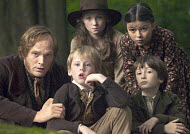 Also on the positive side, Darwin comes off as a strong family man in the film, which, by all accounts, he was. Portraying this side of Darwin is probably an intentional P.R. white-washing by the producers of a man whose beliefs had unintended disastrous consequences on the world (e.g., fueling racism, violence, etc.). Evolutionists often claim that biblical creationists look upon Darwin as something of an evil man, but except for a few isolated quotes from creationists, that is a view not promoted by the leading creationist organizations. At the same time, we don’t hesitate to discuss the evil fruit of evolution thinking.
Also on the positive side, Darwin comes off as a strong family man in the film, which, by all accounts, he was. Portraying this side of Darwin is probably an intentional P.R. white-washing by the producers of a man whose beliefs had unintended disastrous consequences on the world (e.g., fueling racism, violence, etc.). Evolutionists often claim that biblical creationists look upon Darwin as something of an evil man, but except for a few isolated quotes from creationists, that is a view not promoted by the leading creationist organizations. At the same time, we don’t hesitate to discuss the evil fruit of evolution thinking.
The film does not shy from the fact that Darwin was not an originator of the concept of evolution. “Creation” depicts how Alfred Russel Wallace, independent of Darwin and through his own research abroad, had also come up with the idea of evolution through natural selection. When Darwin discovers this (as the movie shows), he sets aside twenty years of procrastination and rushes to get Origins to the printer. By the way, Darwin’s grandfather Erasmus was already a believer in evolution, and naturalistic views of evolution go back to the ancient Greeks. Henry Morris, The Long War Against God (Green Forest, Arkansas: Master Books, 2003).
Darwin and Death
Written with a backdrop of Darwin’s family misfortunes, On the Origin of Species is essentially a book on the history of death. As Darwin wrote towards the end of the book:
“Thus, from the war of nature, from famine and death, the most exalted object which we are capable of conceiving, namely, the production of the higher animals, directly follows.” (C. Darwin, On the Origin of Species (Cambridge, Massachusetts: Harvard University Press, 1964), p. 490.)
From his evolutionary perspective on the origin of life, Darwin recognized that death had to be a permanent part of the world. Undoubtedly, he struggled with this issue as he sought to reconcile some sort of belief in God with the death and suffering he observed all around him (especially with Annie) and which he believed had taken place over a very long time that was well outside the biblical timeline of 6,000 years. His personal struggle over why there could be so much death in the world if there was a God came to a head with Annie.
Is the age of the Earth a “trivial” doctrinal point? Answer
What the Bible says about Death

A good-natured Paul Bettany (far right) posed with his traveling companions for a photo inside the Creation Museum.
From a reading of Genesis and accepting it as a straightforward, literal history of the world’s beginnings, there was once a perfect world (“very good”; Genesis 1:31), but through Adam’s rebellion the creation became corrupted. As a consequence, death entered the perfect world (Romans 5:12). The apostle Paul described death as an interloper, calling it the “last enemy” (1 Corinthians 15:26).
Ultimately, then, the battle between creation and evolution is a struggle between two different histories of death and where humankind is going. As Christians, we have hope in a risen Christ who conquered death so that one day we can be with Him where there will be no death:
“And God shall wipe away all tears from their eyes; and there shall be no more death, neither sorrow, nor crying, neither shall there be any more pain: for the former things are passed away” (Revelation 21:4).
Now, if a Christian accepts a history of death over millions of years, what does he or she do with the teaching that everything God had made was “very good”? “Survival of the fittest” would mean that suffering, disease (e.g., TB), and death—represented in the fossil record—were also “very good.” The true history of death, as understood from a straightforward reading of Genesis, enables us to recognize a loving Creator who hates death, an enemy.
Learn more about AIG’s world famous Creation Museum, located 7 miles from the Cincinnati Airport—Go
What kind of world would you create? Go
See list of Relevant Issues—questions-and-answers.






The film showed a man’s struggle after the loss of his daughter. In the film it shows her visiting him after her death, but unlike the other reviewer, I did not believe her to be portrayed as a ghost haunting him, but his memories and conscience. I felt the film showed him as a frail, grief stricken, oftentimes delusional man searching for a scientific solution to his frustration with God allowing his beloved daughter to be taken from him.
I think the film demonstrated how inaccurate the source of evolution theory could be.
Be warned that there are scenes of nudity, animal cruelty, and that this is not a suitable film for children.
My Ratings: Moral rating: Average / Moviemaking quality: 5